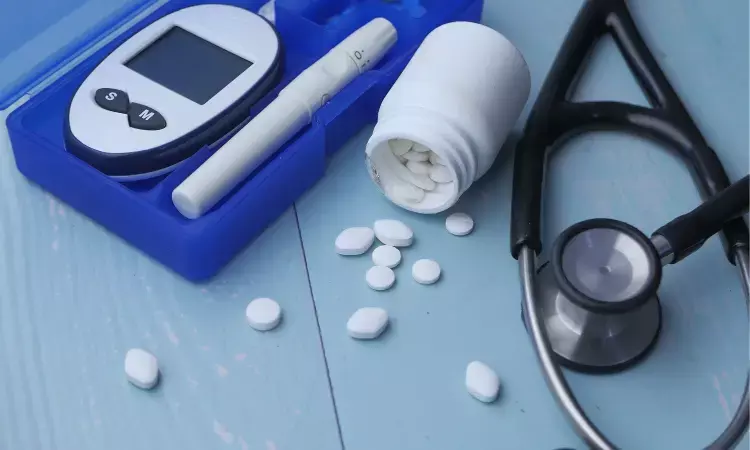- Home
- Medical news & Guidelines
- Anesthesiology
- Cardiology and CTVS
- Critical Care
- Dentistry
- Dermatology
- Diabetes and Endocrinology
- ENT
- Gastroenterology
- Medicine
- Nephrology
- Neurology
- Obstretics-Gynaecology
- Oncology
- Ophthalmology
- Orthopaedics
- Pediatrics-Neonatology
- Psychiatry
- Pulmonology
- Radiology
- Surgery
- Urology
- Laboratory Medicine
- Diet
- Nursing
- Paramedical
- Physiotherapy
- Health news
- Fact Check
- Bone Health Fact Check
- Brain Health Fact Check
- Cancer Related Fact Check
- Child Care Fact Check
- Dental and oral health fact check
- Diabetes and metabolic health fact check
- Diet and Nutrition Fact Check
- Eye and ENT Care Fact Check
- Fitness fact check
- Gut health fact check
- Heart health fact check
- Kidney health fact check
- Medical education fact check
- Men's health fact check
- Respiratory fact check
- Skin and hair care fact check
- Vaccine and Immunization fact check
- Women's health fact check
- AYUSH
- State News
- Andaman and Nicobar Islands
- Andhra Pradesh
- Arunachal Pradesh
- Assam
- Bihar
- Chandigarh
- Chattisgarh
- Dadra and Nagar Haveli
- Daman and Diu
- Delhi
- Goa
- Gujarat
- Haryana
- Himachal Pradesh
- Jammu & Kashmir
- Jharkhand
- Karnataka
- Kerala
- Ladakh
- Lakshadweep
- Madhya Pradesh
- Maharashtra
- Manipur
- Meghalaya
- Mizoram
- Nagaland
- Odisha
- Puducherry
- Punjab
- Rajasthan
- Sikkim
- Tamil Nadu
- Telangana
- Tripura
- Uttar Pradesh
- Uttrakhand
- West Bengal
- Medical Education
- Industry
Efpeglenatide significantly lowers blood sugar and body weight in type 2 diabetes: AMPLITUDE-M trial

Korea: Monotherapy with once-weekly efpeglenatide signiifcanly improved blood sugar control and body weight in patients with type 2 diabetes managed with diet and exercise alone, a recent study in Diabetes Care has revealed. Its safety and tolerability was found to be similar to that of other glucagon-like peptide 1 receptor agonists (GLP-1 RAs) with a low risk of hypoglycemia.
Owing to their glycemic efficacy, low risk of hypoglycemia, and favorable effects on body weight, GLP-1 RAs are currently recommended as the first injectable agent for patients with type 2 diabetes inadequately controlled on oral glucose-lowering medications. Seungjae Baek, Hanmi Pharmaceutical Co., Ltd, Seoul, Korea, and colleagues aimed to assess the safety and efficacy of the glucagon-like peptide 1 receptor agonist (GLP-1 RA) efpeglenatide versus placebo in patients with type 2 diabetes inadequately controlled with diet and exercise alone in AMPLITUDE-M trial -- a phase 3, double-blind, placebo-controlled, multicenter trial.
In the trial, adults with type 2 diabetes suboptimally controlled with diet and exercise alone were randomized to once-weekly efpeglenatide (2, 4, or 6 mg) or placebo for up to 56 weeks. The main objective was to demonstrate the superiority of efpeglenatide versus placebo for HbA1c reduction at week 30. Secondary objectives included changes in other measures of glycemic control and body weight at weeks 30 and 56.
Key findings include:
- At week 30, HbA1c was reduced from a baseline of 8.1% (65 mmol/mol) to 6.9% (52 mmol/mol), 6.6% (49 mmol/mol), and 6.4% (47 mmol/mol) with efpeglenatide 2, 4, and 6 mg, respectively.
- Least squares mean HbA1c reductions from baseline were statistically superior for each efpeglenatide dose versus placebo (2 mg, −0.5%; 4 mg, −0.8%; 6 mg, −1.0%)
- A greater proportion of efpeglenatide-treated patients (all doses) achieved HbA1c <7% (53 mmol/mol) versus placebo by week 30, and significant reductions in body weight and fasting plasma glucose were also observed for efpeglenatide (4 and 6 mg doses) versus placebo at week 30.
- Consistent with the GLP-1 RA class, gastrointestinal adverse events were most commonly reported; these were generally transient and mild/moderate in severity. Few patients reported hypoglycemia.
"Monotherapy with once-weekly efpeglenatide significantly improved glycemic control, lowering mean HbA1c levels to <7% (53 mmol/mol) with meaningful body weight loss in patients with type 2 diabetes managed with diet and exercise alone," the researchers wrote in their study.
"Patients treated with efpeglenatide had low incidence of efpeglenatide and its safety and tolerability profile was consistent with that of the GLP-1 RA class."
Reference:
Juan Pablo Frias, JaeDuk Choi, Julio Rosenstock, Luiza Popescu, Elisabeth Niemoeller, Isabel Muehlen-Bartmer, Seungjae Baek; Efficacy and Safety of Once-Weekly Efpeglenatide Monotherapy Versus Placebo in Type 2 Diabetes: The AMPLITUDE-M Randomized Controlled Trial. Diabetes Care 7 July 2022; 45 (7): 1592–1600. https://doi.org/10.2337/dc21-265
Dr Kamal Kant Kohli-MBBS, DTCD- a chest specialist with more than 30 years of practice and a flair for writing clinical articles, Dr Kamal Kant Kohli joined Medical Dialogues as a Chief Editor of Medical News. Besides writing articles, as an editor, he proofreads and verifies all the medical content published on Medical Dialogues including those coming from journals, studies,medical conferences,guidelines etc. Email: drkohli@medicaldialogues.in. Contact no. 011-43720751


